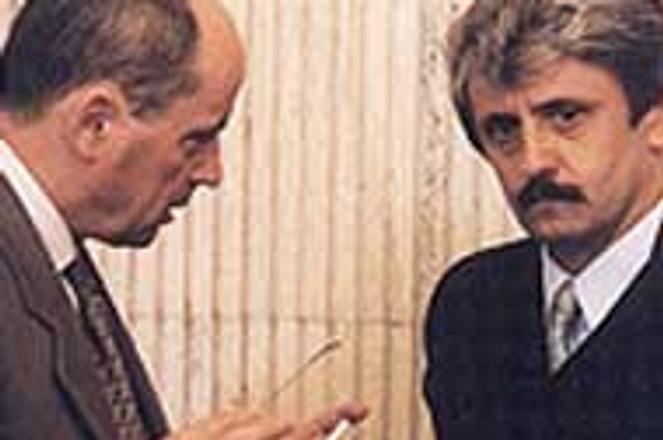Justice Minister and KDH deputy Ján Čarnogurský (left) is pleased with the new agreement, while Prime Minister Mikuláš Dzurinda is not so sure it will prolong the existence of the SDK.photo: Vladimír Hák - Profit
The deeply divided Slovak Democratic Coalition (SDK), the largest party in the nation's coalition government, has come up with a plan to increase both its internal stability and its influence on the domestic political stage. SDK officials say disagreement over who to support in the country's presidential elections, as well as over how to solve Slovakia's economic predicament, have shaken the party to its core.
The agreement, dubbed the "Stability Pact," is set to be debated and approved at the SDK's June 20 national congress. The pact attempts to calm tensions between the SDK and its five mother parties - the right wing Christian Democratic Movement (KDH), the liberal Democratic Union (DÚ), the free-market Democratic Party (DS), the socialist Slovak Social-Democratic Party (SDSS) and the leftist Slovak Green Party (SZS).
One of the most important aspects of the Stability Pact is the foundation of a Council of Chairmen, a novel institution which will consist of the heads of all mother parties and the SDK chairman.
The agreement also spells out the functions of the SDK parliamentary caucus (a sort of parliamentary club for SDK deputies), clarifies the party's political programme, and defines its relations to both the cabinet and the three other parties of the ruling coalition. Furthermore, the document sets rules for replacing SDK deputies who resign their seats or are expelled from parliament, and outlines how SDK finances are to be shared between the five mother parties.
According to Ivan Šimko, an SDK legal expert, the Council of Chairmen in particular will help the SDK function more like a traditional coalition. The Council will co-ordinate SDK activities and deal with important tasks concerning the coalition party.
"The intent of this agreement [the Stability Pact]," Šimko said, "is to strengthen the stability of the [coalition] government." He said that with the party rules now set out in black and white, SDK ministers and parliamentary deputies would waste less time and energy on political intrigues and quarrelling.
Pavol Hrušovský, vice-chairman of the Christian Democratic Movement (KDH), agreed and said that his party was ready to sign the pact. He said that he believed the pact would shed fresh light on problems between the SDK and its mother parties, and ease tensions in decision-making mechanisms.
"The situation in the mother parties has to be calmed down, and their positions have to be strengthened," Hrušovský said at a May 20 press conference. "Strengthening the positions of the mother parties can make the SDK's position stronger, and through that improve the unity of the entire [ruling] coalition."
The Slovak Democratic Coalition was formed in July 1997 as a coalition opposing the third government of former Prime Minister Vladimír Mečiar. In March 1998, however, the SDK was forced to transform from a coalition into a single party under the threat of losing a substantial part of its voters due to an election law amendment introduced by the Mečiar cabinet. The amendment was ruled unconstitutional by the Slovak Constitutional Court late last year.
Since becoming a single party, the SDK has been wracked by internal tensions over the division of powers between the mother parties and the SDK. After the September, 1998 national elections, the stability of the SDK was severely shaken on several occasions, such as the decision of KDH chairman and Justice Minister Ján Čarnogurský not to vote for his own cabinet's programme in November 1998.


